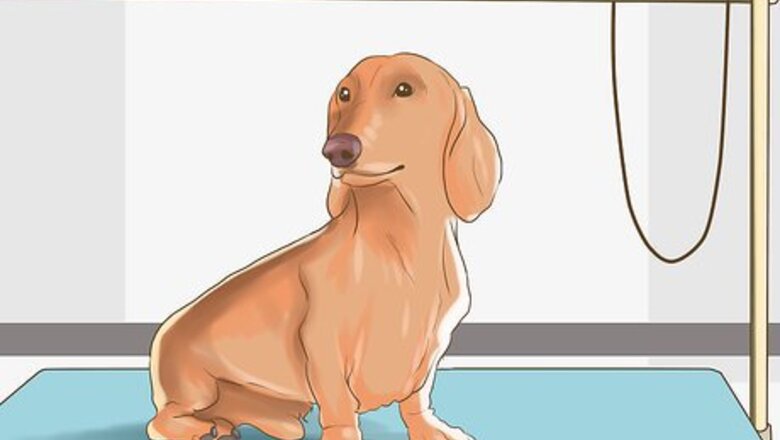
views
Grooming Your Dachshund’s Fur
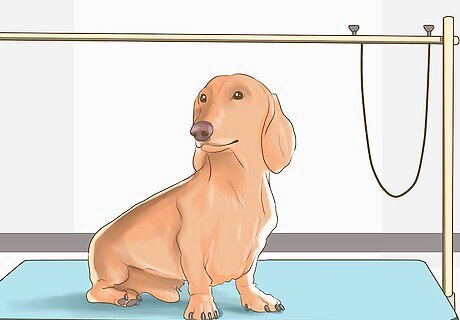
Place your dog on a table. In order to effectively brush your dog, you’ll want it to be lifted up off the ground. It may work to set it on your kitchen table or counter. Alternatively, you may want to invest in a grooming table (available at pet stores and online). It is a good idea to spread out any grooming tools you may need (such as a brush and silk scarf) before you begin. Most grooming tables have a place to secure your dog’s neck, which can be helpful if your dog likes to squirm. Never leave your dog unattended on the table.
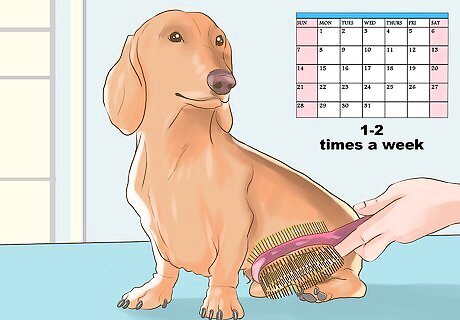
Brush your dog’s hair. Using either a hard rubber brush or a mitt with rubber nubs, carefully brush your dog’s fur to remove any shedding hair. Brush in the direction of fur growth, starting at the neck and ending near the tail. Be sure to brush your dog all over their body. Your shorthaired dachshund only needs to be brushed 1-2 times per week. Hard rubber brushes and mitts with rubber nibs are both available at most pet stores. Consult a salesperson if you are not sure which brush to choose.
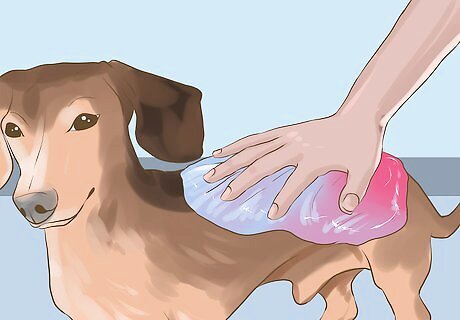
Shine the fur with a silk scarf. After you have brushed your dog’s fur, you can gently rub it with a silk scarf. This gives the fur a luminous shine, and usually feels pleasant for the dog.
Bathing Your Dachshund
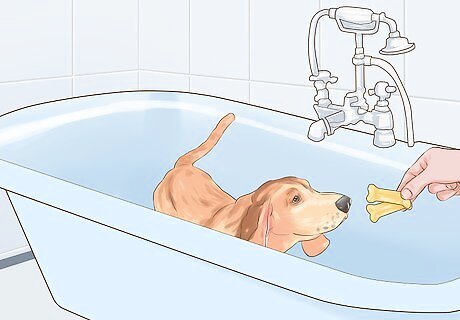
Create positive associations with bathing. Some dogs are afraid of the bath. You can help your dog associate the bath with positive experience with a few tricks. Start by placing your dog in the bathtub without water. Do this multiple times in the days prior to a bath. Bathe it in minimal water. Work up to pouring water over it (especially over its face) as it becomes more comfortable. Whenever you bathe your dog, offer it a treat and lots of praise.
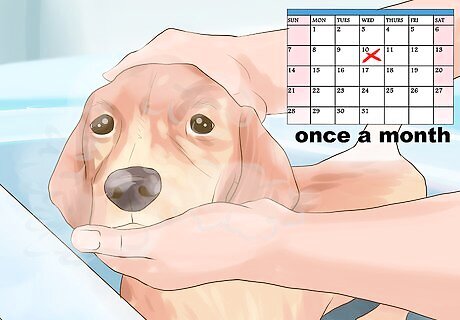
Avoid bathing your dog too often. Dachshunds produce a special hair oil that helps to insulate them from the elements. Bathing your shorthaired dachshund too often will remove this oil. Unless your dog is covered in dirt or your veterinarian recommends it, only bathe your dachshund around once a month.
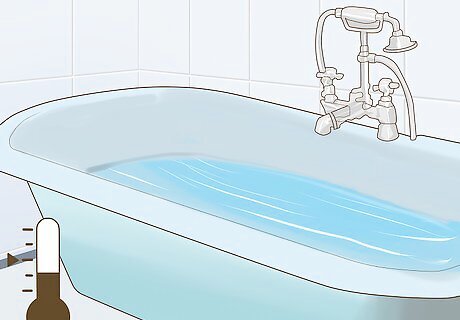
Fill a tub with lukewarm water. Dogs are sensitive to water temperature, just like people. Fill your tub with warm (but not too hot) water. You will want the water to come up no higher than your dog’s tummy. If your dog is small enough, you may be able to use the sink. You can also use a baby pool in the yard when it's a hot day.
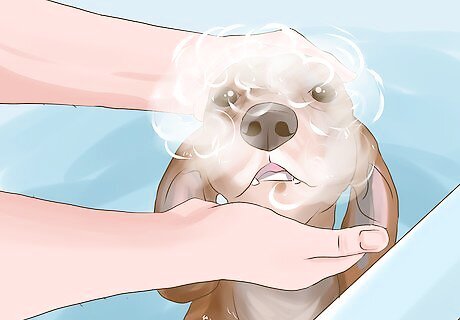
Apply shampoo. Pour out about a quarter-size dollop of shampoo, lather it in your hands, and begin applying to your dog. Many dogs enjoy being bathed. If yours does not, ask a friend to help keep it stable and calm as you apply and lather the shampoo. Be sure to use dog shampoo which is formulated to maintain the pH balance of a dog’s skin. Be sure to lather their back, belly, and the top of their head. Avoid getting soap in their eyes or ears. Do not use your fingernails to shampoo. It can scratch your dog’s skin.
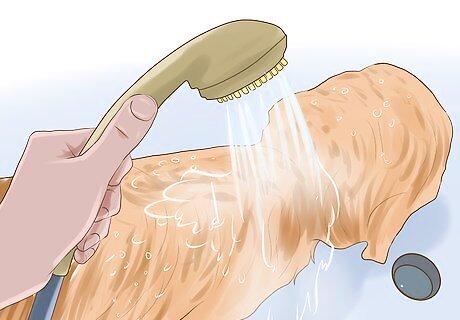
Rinse. Carefully pour water over your dog’s fur to remove all the suds. If your bathtub has a detachable shower head, this will work great. Otherwise, a bucket or other container will work. Be careful not to let any soap flow into your dog’s eyes. Wash and rinse your dog’s face last to minimize the time the shampoo is in contact with the area.
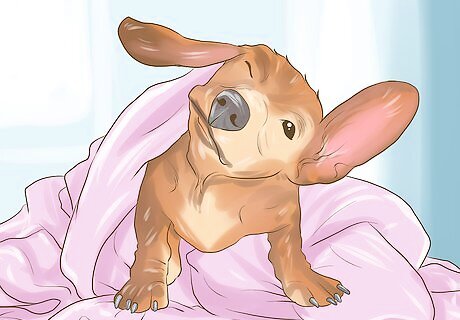
Dry your dog. Using a warm, fluffy towel carefully remove any excess water from your dog. You may also want to stand back and allow your dog to “shake.” If the sound does not bother your dog, you can also apply heat from a hair dryer on its lowest setting.
Cleaning Other Parts of Your Dachshund
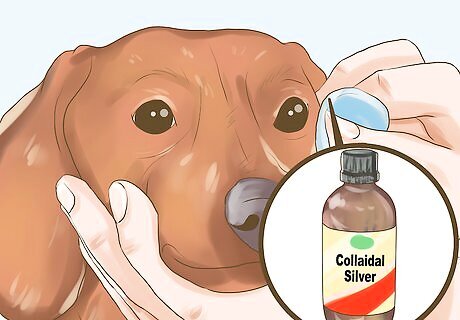
Clear off any “tear staining.” Many shorthaired dachshunds have a condition called epiphora, which means that tears overflow from their eyes. You can wipe away any tear build up as often as every day, or as needed. If you think your pup suffers from an overflow of tears, see a veterinary ophthalmologist to determine if there is an underlying ocular condition.
Apply an ear cleaner with a drying agent. Do not use water to clean your dachshund’s ears, as it could lead to infection. Ask your veterinarian to recommend an ear cleaner that contains a drying agent and follow the use instructions carefully.
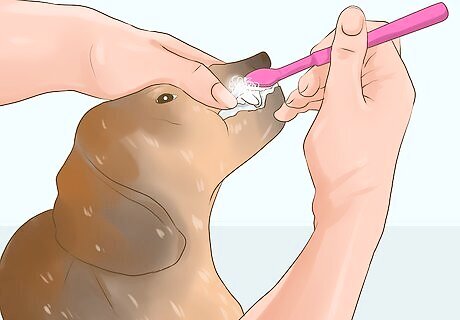
Brush your dog’s teeth. Dental hygiene is an important aspect of your dachshund’s health. You can purchase a dog toothbrush and dog toothpaste from most pet stores. Before you try brushing your dog’s teeth, make sure that your dog is comfortable with your hand in their mouth. Place your dachshund on your lap facing away from you. Peel their lips back with your non-dominant hand. Holding the toothbrush in your dominant hand, begin brushing the front teeth. Next, use your non-dominant hand to open your dachshund’s mouth. Holding the toothbrush in your dominant hand, brush the back teeth and molars.
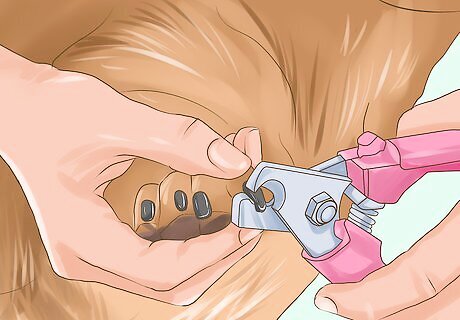
Clip their nails. Clipping your dog’s nails is another important part of regular grooming. Because a dachshund’s nails are black, it is hard to see the quick so it’s important that you receive training from a professional dog groomer or veterinarian before clipping your dog’s nails. Once you’ve been shown how to properly do so, you can: Identify the “quick.” (A dark area inside the nail that contains blood vessels.) Place your dachshund on your lap facing away from you. Hold your dog’s paw firmly in your non-dominant hand. Slide each claw through the small hole in the nail clippers (above the quick). Squeeze the nail clipper. You may want to lie your dachshund on its side to trim the back paws.


















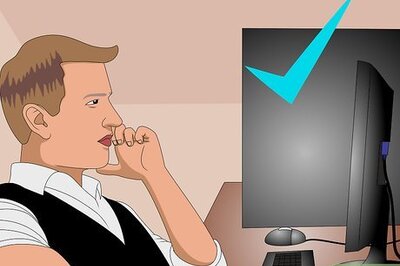
Comments
0 comment